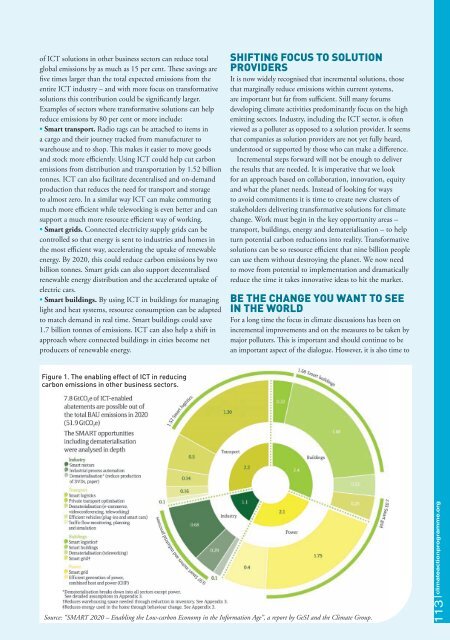Climate Action 2011-2012
You also want an ePaper? Increase the reach of your titles
YUMPU automatically turns print PDFs into web optimized ePapers that Google loves.
of ICT solutions in other business sectors can reduce total<br />
global emissions by as much as 15 per cent. These savings are<br />
five times larger than the total expected emissions from the<br />
entire ICT industry – and with more focus on transformative<br />
solutions this contribution could be significantly larger.<br />
Examples of sectors where transformative solutions can help<br />
reduce emissions by 80 per cent or more include:<br />
• Smart transport. Radio tags can be attached to items in<br />
a cargo and their journey tracked from manufacturer to<br />
warehouse and to shop. This makes it easier to move goods<br />
and stock more efficiently. Using ICT could help cut carbon<br />
emissions from distribution and transportation by 1.52 billion<br />
tonnes. ICT can also facilitate decentralised and on-demand<br />
production that reduces the need for transport and storage<br />
to almost zero. In a similar way ICT can make commuting<br />
much more efficient while teleworking is even better and can<br />
support a much more resource efficient way of working.<br />
• Smart grids. Connected electricity supply grids can be<br />
controlled so that energy is sent to industries and homes in<br />
the most efficient way, accelerating the uptake of renewable<br />
energy. By 2020, this could reduce carbon emissions by two<br />
billion tonnes. Smart grids can also support decentralised<br />
renewable energy distribution and the accelerated uptake of<br />
electric cars.<br />
• Smart buildings. By using ICT in buildings for managing<br />
light and heat systems, resource consumption can be adapted<br />
to match demand in real time. Smart buildings could save<br />
1.7 billion tonnes of emissions. ICT can also help a shift in<br />
approach where connected buildings in cities become net<br />
producers of renewable energy.<br />
ShifTing focuS To SoluTion<br />
providErS<br />
It is now widely recognised that incremental solutions, those<br />
that marginally reduce emissions within current systems,<br />
are important but far from sufficient. Still many forums<br />
developing climate activities predominantly focus on the high<br />
emitting sectors. Industry, including the ICT sector, is often<br />
viewed as a polluter as opposed to a solution provider. It seems<br />
that companies as solution providers are not yet fully heard,<br />
understood or supported by those who can make a difference.<br />
Incremental steps forward will not be enough to deliver<br />
the results that are needed. It is imperative that we look<br />
for an approach based on collaboration, innovation, equity<br />
and what the planet needs. Instead of looking for ways<br />
to avoid commitments it is time to create new clusters of<br />
stakeholders delivering transformative solutions for climate<br />
change. Work must begin in the key opportunity areas –<br />
transport, buildings, energy and dematerialisation – to help<br />
turn potential carbon reductions into reality. Transformative<br />
solutions can be so resource efficient that nine billion people<br />
can use them without destroying the planet. We now need<br />
to move from potential to implementation and dramatically<br />
reduce the time it takes innovative ideas to hit the market.<br />
bE ThE changE you wanT To SEE<br />
in ThE world<br />
For a long time the focus in climate discussions has been on<br />
incremental improvements and on the measures to be taken by<br />
major polluters. This is important and should continue to be<br />
an important aspect of the dialogue. However, it is also time to<br />
Figure 1. The enabling effect of ICT in reducing<br />
carbon emissions in other business sectors.<br />
Source: “SMART 2020 – Enabling the Low-carbon Economy in the Information Age”, a report by GeSI and the <strong>Climate</strong> Group.<br />
113 climateactionprogramme.org












